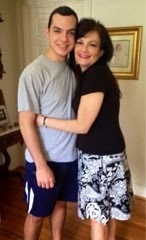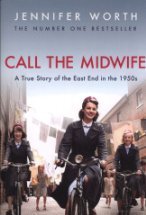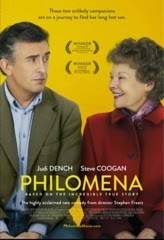Caroline Friday's Blog, page 864
August 30, 2014
Braxton's London Digs!
 His new home - close sleeping quarters, but a nice flat near the British Museum and in the heart of Bloomsbury.
His new home - close sleeping quarters, but a nice flat near the British Museum and in the heart of Bloomsbury.




Published on August 30, 2014 06:38
August 27, 2014
Off to the UK!
 And he's off! Lots of adventures and wonderful life experiences. Praise God for Viber, Skype, & Facebook! I'll be able to keep track of his comings and goings. Sort of!
And he's off! Lots of adventures and wonderful life experiences. Praise God for Viber, Skype, & Facebook! I'll be able to keep track of his comings and goings. Sort of!






 Love the UK. Great country full of loving people who are friendly and kind. A bit jealous!!
Love the UK. Great country full of loving people who are friendly and kind. A bit jealous!!
Published on August 27, 2014 14:44
August 26, 2014
Going Cosmo!
 With Braxton heading off to FSU's FYA program in London, we thought it might be a good idea to update his high school wardrobe a bit. Here he is hamming it up in his new togs, complete with new shoes and belt. The sweater over the shoulder is just a joke - I don't for see him walking around the UK looking like a catalog model! We'll see if he actually wears them. He does look nice, that's for sure!
With Braxton heading off to FSU's FYA program in London, we thought it might be a good idea to update his high school wardrobe a bit. Here he is hamming it up in his new togs, complete with new shoes and belt. The sweater over the shoulder is just a joke - I don't for see him walking around the UK looking like a catalog model! We'll see if he actually wears them. He does look nice, that's for sure!

Published on August 26, 2014 15:23
August 17, 2014
Back to UGA!
Published on August 17, 2014 15:31
August 16, 2014
Dorm Room Decorators
 Bill and I spent last weekend decorating Anna's new college bedroom at UGA while she finished up her studies at Oxford. Our years of experience painting rooms came in handy as we knocked out a quick paint job in no time! Things really turned out beautiful! Now we head back to Athens with her tomorrow for the final move in and complete the finishing touches! Love to decorate!
Bill and I spent last weekend decorating Anna's new college bedroom at UGA while she finished up her studies at Oxford. Our years of experience painting rooms came in handy as we knocked out a quick paint job in no time! Things really turned out beautiful! Now we head back to Athens with her tomorrow for the final move in and complete the finishing touches! Love to decorate!












Published on August 16, 2014 21:33
August 11, 2014
Call the Midwife
 I am in tears after having spent the first week of my summer engrossed in three seasons of the BBC drama, Call the Midwife. Truly, I have never seen a television serial more heart-felt and touching than this story of a group of young English midwives and Catholic nuns living together in the poorest parts of London. The setting is the late 50s, where hair styles and fashion still harken to the dowdy post-WWII days. That, and their meager living quarters are the antithesis to the typical BBC drama we Americans are used to viewing, except in a Dickens tale. Normally, we like seeing castles and the grand, stately homes of the aristocracy, such as the Granthams of Downton Abby. But the Granthams aren’t half as interesting as these sweet, giving ladies whose calling is to help bring new life into the world. I feel like I’ve just said good-bye to life-long friends who I may never see again. Season four airs in spring, 2015, and that seems to be eons from now.
I am in tears after having spent the first week of my summer engrossed in three seasons of the BBC drama, Call the Midwife. Truly, I have never seen a television serial more heart-felt and touching than this story of a group of young English midwives and Catholic nuns living together in the poorest parts of London. The setting is the late 50s, where hair styles and fashion still harken to the dowdy post-WWII days. That, and their meager living quarters are the antithesis to the typical BBC drama we Americans are used to viewing, except in a Dickens tale. Normally, we like seeing castles and the grand, stately homes of the aristocracy, such as the Granthams of Downton Abby. But the Granthams aren’t half as interesting as these sweet, giving ladies whose calling is to help bring new life into the world. I feel like I’ve just said good-bye to life-long friends who I may never see again. Season four airs in spring, 2015, and that seems to be eons from now.Based on the memoirs of Jennifer Worth, Call the Midwife is based on a slice of history that is foreign to the typical American. Many of us have heard of women giving birth through the services of a midwife, but in the US, it is a bit unusual and odd. Not so in the UK. The practice became accepted during WWII when British doctors were scarce and women had to rise to the occasion and perform duties typically relegated to men. During my five years in London in the late 90s, I knew several women who gave birth through midwives.
Confession: the first episode turned me off, and I promptly “tuned out” about halfway through. Watching poor English women endure excruciating pain without the comforts of modern medicine AND in extreme unsanitary conditions did not make for a relaxed time of entertainment in my mind. So I put this series aside for about a year, ignoring my mother’s pleas to give it another chance. Eventually, having exhausted all the other BBC serials on Netflix, I did just that, forcing myself through the first episode. Fortunately, by the end of episode two, I was hooked.
What is the appeal? As always with a good serial, it is the characters. Each episode is introduced and closed with the haunting voiceover of Jenny Lee (Vanessa Redgrave), who recounts her memories as a midwife during post-Korean War days. Naïve and idealistic, Jenny (played by up-and-coming A-lister, Jessica Raine) begins her story arriving at an old, crumbling building in London’s East End. Cold and unassuming, Nonnatus House is actually a warm, loving environment, run by four unique, yet quirky nuns. One of my favorites is Sister Julienne (played by Jenny Agutter), who is thin and beautiful and wears a perpetual smile while espousing wisdom and knowledge at every turn. In contrast, my other favorite, Sister Evangeline (played by Pam Ferris), is thick and burly and normally bears a sour countenance. But underneath her bossy attitude is a heart of gold and plenty of her own form of street-smarts advice to carry the day. I wasn’t as much of a fan of Sister Monica Joan (played by Judy Parfitt) and Sister Bernadette, but they do add a bit of flavor to the ensemble.
The true strength of the show is in the diverse personalities of the four young midwives living under the authority of Sisters Julienne and Evangeline. First, there is our heroine, Jenny, who is gorgeous, smart, and self-sufficient; Trixie (Helen George), who is sexy and sassy with a full head of blonde curls and plenty of brains to go with it; and Cynthia (Bryony Hannah), who is plain, sweet, and unassuming. I absolutely adored those three characters, but the one that stole my heart is Chummy, played by the famous UK comedienne, Miranda Hart.
Standing over six feet tall, with glasses, slouched shoulders, and a botched short hair-do, Chummy (real name Camilla) is the most unlikely character on a television serial with whom anyone could imagine falling head-over-heels in love (even my hubby adores her!). Born from aristocracy, Chummy hasn’t a lick of poise or physical attractiveness in keeping with her station in life. Think lumbering ugly duckling, awkward nerd, and drag queen lookalike all rolled into one. Yet, she is charming, adorable, full of wit and encouragement, and likes herself enough to romance the local constable (Ben Caplan). Her character is a huge reason the show has been so successful (drawing 10 million viewers per episode). Personally, I think it is because Chummy represents the beauty of a woman emanating from the inside out and not solely from the external as the world demands.
For those of you who need your British love interests, there are plenty of handsome suitors to satisfy. And you’ll certainly see more than your fair share of sweet babies being born, AND be very thankful for the blessing of epidurals that are common today. In addition, the drama is top-notch, including a sprinkling of mystery, edge-of-your-seat suspense, laughs, and spiritual reverence toward God and Jesus (very rare today). But mostly this show oozes a sweetness that isn’t contrived or false—it reveals the power of the love of a group of very different women who become soul sisters by living out a life that is unusual and sacrificial.
I cannot recommend this series enough! Make sure you get past the first episode—you won’t be sorry!
Published on August 11, 2014 13:00
August 4, 2014
First Day of School
 Last child to drive to school as a high school Senior! Can't believe it! After this year, no more Cobb County schools!
Last child to drive to school as a high school Senior! Can't believe it! After this year, no more Cobb County schools!

Published on August 04, 2014 04:06
August 3, 2014
Rachel's Senior Pictures
Published on August 03, 2014 19:43
July 28, 2014
Walton Raiders - the senior class!
 These are the senior football players and cheerleaders of the class of 2015. It's going to be a great year!
These are the senior football players and cheerleaders of the class of 2015. It's going to be a great year!
Published on July 28, 2014 04:43
July 8, 2014
Monthly Movie Review - Philomena
 Philomena is a powerful and disturbing film that makes one angry, sad, and astounded at some of the things professing Christians have done to innocent people throughout history in the name of God.
Philomena is a powerful and disturbing film that makes one angry, sad, and astounded at some of the things professing Christians have done to innocent people throughout history in the name of God.Starring one of my favorite actresses, Judi Dench, the story is based on a true case of an unmarried Irish girl in the early 50s whose baby is sold into adoption against her will. Not uncommon in that day, unwed teens who found themselves in the “family way” were shuttled off to a convent where they worked as sweatshop slaves (in this case, as laundresses) to help pay for their convalescence. Fear of societal reprisals and damnation to Hell by the Catholic Church were enough to convince these girls to sign away their children in exchange for a life of secrecy and sins figuratively swept under the rug. The girls were allowed to see their children only one hour out of the day for the first few years of their lives, which was a bittersweet torture for those who survived. Many of them did not live through childbirth, and their babies often died from numerous afflictions. For those who did make it through, the inevitable was awaiting them, ready to strike unawares. While not openly discussed, it was known that one day a shiny motorcar driven by a wealthy couple would arrive at the convent unannounced,whisking their precious child away to some far off place. With no good-bye and no opportunity to learn about the families who would adopt their babies, the girls were left to emotionally rot in their misery, deemed by the established church as a proper atonement for their sins.
This is exactly what happened to the heroine of this movie, Philomena. Her adorable little boy, Anthony, was taken from her when she was just a girl and he a small toddler. Fortunately, a friendly nun pilfered a photograph of Anthony which Philomena kept in her possession for many years. Unbeknownst to anyone, she would often retrieve the picture from its secret hiding place and gaze at the image of the little son who she loved, still holding out hope that they would one day be reunited.
This is where the movie opens—with Philomena living as an elderly widow and mother of a grown daughter, Jane, who cares for her in her old age. Time is slipping away, and Philomena knows she must take action now to discover the whereabouts of her missing child. She shares the picture of Anthony with Jane, and the hunt is on to discover what happened to him.
Parallel to Philomena’s story, is the subplot of a down-and-out, high-profile political columnist, Martin Sixsmith (played wonderfully by Steve Coogan who also co-wrote the script), looking for an opportunity to get himself back into the journalism game. He meets Jane at a cocktail party and agrees to help discover Anthony’s whereabouts in exchange for a juicy story. Philomena accepts his terms, and the film quickly switches to a fun buddy movie where two unlikely Brits go on a real-life scavenger hunt to unravel this mystery. They start out at the convent, located in a spooky, wooded setting in Ireland, where they are told that all records of adoptions were destroyed in a fire. But Martin will not be swayed. When probed, the nuns give cryptic answers, refusing to let him speak to the elderly sisters who would have first-hand knowledge of the adoptions. That and a mass, overgrown graveyard filled with tombstones of young girls and their babies are enough to convince him that they are not getting the truth. Sure enough, a quick stop at the local pub and a brief discussion with the bartender and waitress reveal that almost all of the babies ended up in the US.
The beauty of Philomena is the combination of tragedy mixed with the humor of a quirky matriarch and a witty journalist maneuvering a sleuthing expedition on foreign soil. In particular, the nuances of American culture provide for a lot of laughs, such as our decadent, bacon, egg, and waffle breakfasts where portion sizes have no limits. Philomena’s fascination with an all-you-can-eat breakfast bar is as exciting to her (and many Brits based on my experience) as partaking in any other majestic tourist attraction in the US. She is experiencing a new and exciting world, a world that is the home of her long, lost son.
Martin, on the other hand, could care less, being solely interested in securing a compelling story. Where Philomena is hopeful, he is cynical, where she has faith, he is riddled with doubt, where she is forgiving, he is bitter and angry. Their differences in philosophy pose the theme of the movie: how can a person possibly forgive another for the horrible wrongs done to him or her?
** SPOILER ALERT **
Very early in the film, the viewer gets the sense that Philomena is doomed to receive an unfavorable outcome. Yes, after a few phone calls to the embassy and a bit of searching on the Internet, Anthony’s identity is discovered, but it comes with great grief. It turns out that he is really Michael Hess, a prominent and influential lawyer during the Reagan and Bush administrations, who died of AIDS. When Martin tries to speak with Michael’s partner and gather more information, he is met with a cold shoulder and slammed doors until Philomena eventually warms his heart. At this point, the house of cards begins to crumble and the truth of the convent’s involvement in the black-market adoption racket is made clear. How heartbreaking! While Philomena longed to be reunited with her son, she has to settle for knowing that he longed to know her too—even going so far as to travel to Ireland on several occasions to discover her identity before he passed away. Like Martin and Philomena, his inquiries into his adoption were met with forgetful nuns, supposed destroyed documents, and faded memories that could not be triggered for a dying man aching to be reunited with his birth mother. Tragic!
If you are anything like me, your blood may be boiling right now—which is the exact reaction from Martin. Eventually, the road to truth leads to one old, decrepit nun who still resides at the convent. Most of us would never consider confronting an 80-year-old pious woman (much less a Catholic nun) with hell-fire and damnation on her tongue, but Martin has no problem accusing her of acting in direct contradiction to Jesus Christ. Unfortunately, it does sometimes take a nonbeliever to confront our wrong theology before we can see the error of our ways. But she will not relent at his condemnation and persists in justifying her actions, as to be expected. While Philomena graciously forgives, Martin stews in anger.
This may seems like a depressing tale, but the character arcs made by both Philomena and Martin are intriguing. I especially liked how her quiet faith and seemingly impossible love for her wrong-doers has a profound effect on Martin. It is an excellent example of how our witness as believers has more power than carefully crafted judgmental sermons—which don’t really work in bringing about true repentance. In this movie, Martin’s repentance and Philomena’s restoration come through the journey of seeking the truth, through questioning and exploring, through observing faith in others, and through coming to terms with the past and moving forward. And out of that, Philomena experiences a glorious time with a man (Martin), who is not her son, but who could very well have been.
Through this journey, their unique relationship becomes as strong as some mother/son bonds. A lesson to all of us—sometimes the Lord gives us the desires of our heart, but in ways very different from what we can imagine.
Published on July 08, 2014 11:18















